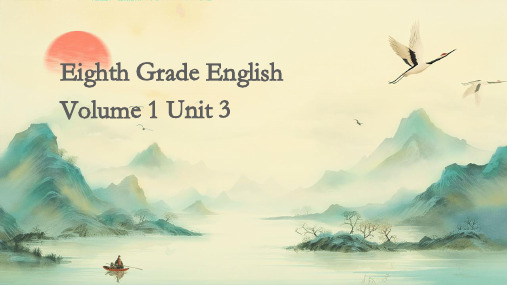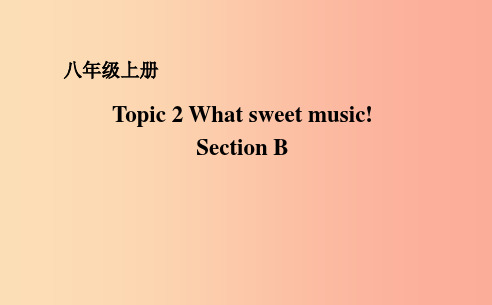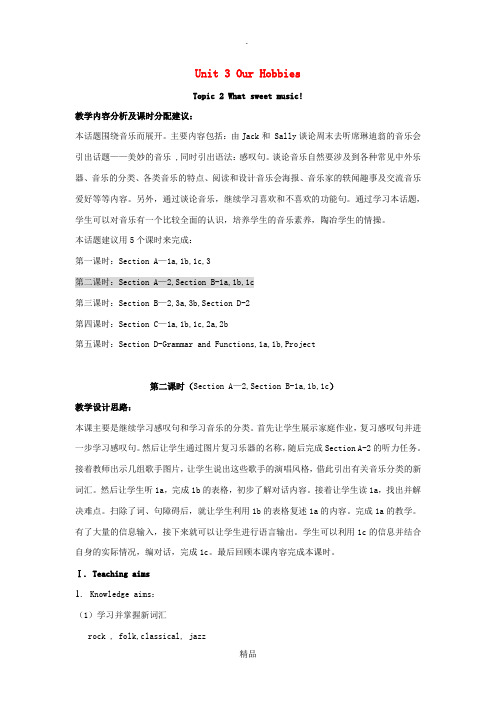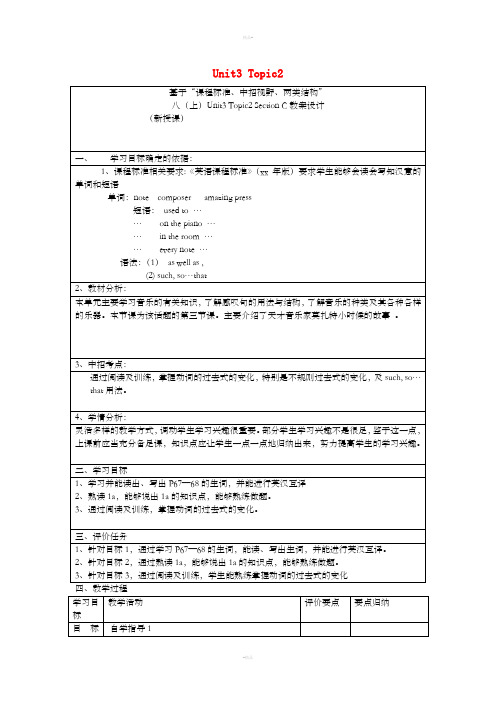福建省东山县樟塘初级中学八年级英语上册 Unit 3 Topic 2 Section D导学案
八年级英语上册unit3

Students will apply critical thinking skills to analyze and interpret the selected texts.
Objective 4
Students will engage in meaningful discussions and collaborations to enhance their understanding of the unit theme.
combining different elements in a story. It also uses transitional phrases ("One of my favorite books is" and "because") to enhance the flow of ideas.
• Development: Develop your ideas fully, providing evidence and examples to support your assertions. Use specific details and examples to illustrate your points.
01
பைடு நூலகம்
Composition Task
Write a composition on a topic of your choice, following the
guidelines provided. Ensure to incorporate the necessary
elements, including introduction, body, and conclusion.
八年级英语上册 Unit 3 Our Hobbies Topic 2 What sweet musi

Key words help us understand important details. Circle key words, and use them when you retell the passage.
Some Types of Music
Classical music is s_e_r_io_u__s_ music. People usually e_n_j_o_y_ it at a concert or in a theater. Beethoven and Mozart wrote great classical music.
Read 1a and make conversations with your partner to 1c describe your feelings about different kinds of music. The
following expressions may help you.
(Like)
It’s great ! I love it ! It’s good music. How exciting ! What sweet music !
(Just so-so)
It’s not my favorite, but I don’t mind it.
(Dislike )
I don’t like this kind of music. I hate listening to rock music.
八年级英语上册 Unit 3 Our Hobbies Topic 2 What sweet musi

Unit 3 Our HobbiesTopic 2 What sweet music!教学内容分析及课时分配建议:本话题围绕音乐而展开。
主要内容包括:由Jack和 Sally谈论周末去听席琳迪翁的音乐会引出话题——美妙的音乐 ,同时引出语法:感叹句。
谈论音乐自然要涉及到各种常见中外乐器、音乐的分类、各类音乐的特点、阅读和设计音乐会海报、音乐家的轶闻趣事及交流音乐爱好等等内容。
另外,通过谈论音乐,继续学习喜欢和不喜欢的功能句。
通过学习本话题,学生可以对音乐有一个比较全面的认识,培养学生的音乐素养,陶冶学生的情操。
本话题建议用5个课时来完成:第一课时:Section A—1a,1b,1c,3第二课时:Section A—2,Section B-1a,1b,1c第三课时:Section B—2,3a,3b,Section D-2第四课时:Section C—1a,1b,1c,2a,2b第五课时:Section D-Grammar and Functions,1a,1b,Project第二课时(Section A—2,Section B-1a,1b,1c)教学设计思路:本课主要是继续学习感叹句和学习音乐的分类。
首先让学生展示家庭作业,复习感叹句并进一步学习感叹句。
然后让学生通过图片复习乐器的名称,随后完成Section A-2的听力任务。
接着教师出示几组歌手图片,让学生说出这些歌手的演唱风格,借此引出有关音乐分类的新词汇。
然后让学生听1a,完成1b的表格,初步了解对话内容。
接着让学生读1a,找出并解决难点。
扫除了词、句障碍后,就让学生利用1b的表格复述1a的内容。
完成1a的教学。
有了大量的信息输入,接下来就可以让学生进行语言输出。
学生可以利用1c的信息并结合自身的实际情况,编对话,完成1c。
最后回顾本课内容完成本课时。
Ⅰ. Teaching aims1.Knowledge aims:(1)学习并掌握新词汇rock , folk,classical, jazz(2)继续学习感叹句和表达喜欢与不喜欢。
八年级上册英语unit 3的知识点

八年级上册英语unit 3的知识点在八年级上册英语教材中,Unit 3是一个非常重要的单元,其中蕴含着丰富的语言知识和文化知识。
本文将详细介绍Unit 3的知识点,以帮助读者更好地学习和掌握英语知识。
一、词汇1. 关于食物和饮料的词汇例句:I like to eat pizza, fried chicken, and ice cream.Tom prefers to drink milk and orange juice.2. 形容词例句:The shirt is too small for me.My brother is very tall and strong.3. 时间和日期例句:We have a math class at 8:30 in the morning. My birthday is on October 10th.4. 数字例句:There are four seasons in a year.The price of this book is ten dollars.二、语法1. 现在进行时态现在进行时态表示现在正在进行的动作。
它的构成是be动词+现在分词。
常见的be动词有:am、is、are。
例句:I am reading a book.They are playing soccer in the park.2. 宾格代词宾格代词是指在句子中作为宾语使用的代词。
常见的宾格代词有:me、you、him、her、it、us、them。
例句:She gave me a gift for my birthday.The teacher asked him a question.3. 物主代词物主代词是用来表示所有权的代词。
常见的物主代词有:my、your、his、her、its、our、their。
例句:This is my book, not yours.His new car is very expensive.三、阅读本单元的阅读部分是一篇介绍英国学校生活的文章。
八年级英语上册 Unit 3 Our Hobbies Topic 2 What sweet mus

八年级英语上册Unit 3 Our Hobbies Topic 2 What sweet music10分钟突破语法感叹句(新版)仁爱版编辑整理:尊敬的读者朋友们:这里是精品文档编辑中心,本文档内容是由我和我的同事精心编辑整理后发布的,发布之前我们对文中内容进行仔细校对,但是难免会有疏漏的地方,但是任然希望(八年级英语上册Unit 3 Our Hobbies Topic 2 What sweet music10分钟突破语法感叹句(新版)仁爱版)的内容能够给您的工作和学习带来便利。
同时也真诚的希望收到您的建议和反馈,这将是我们进步的源泉,前进的动力。
本文可编辑可修改,如果觉得对您有帮助请收藏以便随时查阅,最后祝您生活愉快业绩进步,以下为八年级英语上册Unit 3 Our Hobbies T opic 2 What sweet music10分钟突破语法感叹句(新版)仁爱版的全部内容。
10分钟突破语法:感叹句用以表达喜、怒、哀、乐等强烈感情的句子叫做感叹句.感叹句末尾常用感叹号,也可用句号,一般读降调.常用的感叹句的构成方法有三种:1。
陈述句、疑问句可构成感叹句。
如:It must be great fun!那一定很有趣!Isn’t it exciting!真是有趣!2.单词或短语均可构成感叹句(省去其他句子成分)。
如:Be careful! 小心!Great!太好了!3. 将感叹词how或what置于它所修饰的词前面,即可构成感叹句.how修饰形容词或副词,what修饰名词短语。
现代英语中感叹句往往不加主谓成分。
如:How lovely (the girl is)! (这个女孩)多可爱呀!What interesting passages! 多有趣的文章!巧学妙记感叹句的练习大致有两种:陈述句变成感叹句;选择感叹词完成感叹句。
1.如何将陈述句变成感叹句,通常采用五步法:一断,二去,三加,四换位,五感叹号.一断:找到陈述句的主谓成分后,将句子断开。
八年级上英语Unit 3—【教学课件】

Reasons
I'mquieterand more serious than most kids. That's why I like reading.
Yuan Li is quiet , too. So we enjoy studying together.
like books
I'm shy , so it's not easy for me to make friends.
Yes, they are. 4. Is it easy for Jeff to make friends? Why?
No it isn't. Because he is too shy.
5. What does Jeff think about his friends? He thinks friends are like books - you don't need a lot of them as long as they are good.
If you want to know more sayings about friends. Please read the other two passages at home.
most kids? 3. Are Jeff and Yuan Li both quiet? 4. Is it easy for Jeff to make friends? Why? Jeff Green 5. What does Jeff think about his friends? 6. Does Jeff have many friends?
A: Good morning, I’m a reporter from HuБайду номын сангаасan TV station. May I ask you some questions?
八年级上册英语unit3

八年级上册英语unit3As teenagers, we often face a lot of pressure from school, parents, and society. At times, it can feel overwhelming and affect our mental well-being. In order to cope with this pressure, it's important to find healthy ways to managestress and take care of our mental health.One way to manage stress is to prioritize and organizeour time effectively. By setting realistic goals and breaking tasks into smaller, manageable steps, we can reduce thefeeling of being overwhelmed. Prioritizing tasks also helpsus focus on the most important things, rather than trying to do everything at once.Another important way to manage stress is to engage in regular physical activity. Exercise not only helps to relieve physical tension, but it also releases endorphins in the brain, which can improve our mood and reduce stress. Whetherit's joining a sports team, going for a run, or simply taking a walk outside, finding time for physical activity is essential for our mental well-being.Additionally, it's crucial to make time for activities that bring us joy and relaxation. Whether it's spending time with friends, practicing a hobby, or simply taking a break to read or listen to music, doing things we enjoy can help reduce stress and recharge our mental batteries.Finally, seeking support from friends, family, or school counselors can be incredibly beneficial. It's important to remember that we're not alone, and talking about our feelings and concerns with someone we trust can provide a new perspective and help us feel supported.In conclusion, managing stress and taking care of our mental health is essential for teenagers. By prioritizing and organizing our time, engaging in regular physical activity, making time for relaxation, and seeking support when needed,we can develop healthy coping strategies and take control of our mental well-being. It's important to remember that our mental health is just as important as our physical health, and we should make it a priority in our lives.。
仁爱英语八年级上册Unit3Topic2SectionA

范文:学生可以根据范文进行仿写提高自己的写作水平。
解析:对范文的写作技巧、语法点、常用表达进行解析帮助学生更好地理解和学习。
词汇:提供范文中的重点词汇帮助学生积累词汇。
练习:提供与范文相关的写作练习让学生通过实践提高写作能力。
仁爱英语八年级上册Unit3Topic2Section的口语练习
06
仁爱英语八年级上册Unit3Topic2Section的口语话题和素材添加标题来自添加标题添加标题
话题:谈论最喜欢的音乐类型
素材:I like listening pop music becuse it mkes me feel hppy nd relxed. There re mny fmous pop singers, nd I like their songs very much.
话题:介绍一位你喜欢的歌手
素材:My fvorite singer is Jy Chou. He is fmous Tiwnese singer-songwriter. I like his songs becuse they re very ctchy nd esy sing long with.
祈使句句型
疑问句句型
陈述句句型
仁爱英语八年级上册Unit3Topic2Section的词汇和表达方式
重点词汇:掌握课文中出现的生词和短语能够正确拼写和运用。
表达方式:学习课文中的句型和表达方式能够熟练运用在口语和写作中。
常用搭配:学习课文中常用的固定搭配提高英语表达的地道性。
习惯用法:了解课文中出现的一些习惯用法增强对英语语言的理解。
写作要求:介绍最喜欢的节日包括节日的起源、庆祝方式和意义以及个人感受和体验。
仁爱英语八年级上册Unit3Topic2Section的写作技巧和策略
八年级上册英语Unit3重要知识总结

八年级上册英语Unit3重要知识总结本文档将总结八年级上册英语Unit3的重要知识点,帮助学生复和巩固所学内容。
一、词汇1. 性格特点:kind, outgoing, shy, funny, serious, confident, etc.2. 人物描述:tall, short, slim, strong, attractive, etc.3. 学科类别:maths, science, history, geography, etc.4. 研究方式:hard-working, lazy, organized, messy, etc.5. 学校设施:library, laboratory, playground, etc.6. 研究活动:listen, read, write, speak, study, etc.7. 食物和饮料:hamburger, noodles, pizza, juice, milk, etc.8. 职业类型:doctor, teacher, scientist, musician, etc.二、语法1. 一般现在时:表示经常性或惯性的动作,结构:主语 + 动词原形例:He plays basketball every Sunday.2. 人称代词:用以代替人的名词,包括主格和宾格两种形式。
主格代词作主语,宾格代词作宾语或补语。
例:She is my friend. I like her very much.3. 形容词比较级:用于比较两个人或物之间的差别,表示较高或较低的程度。
比较级的结构:形容词 + er + than / more + 形容词例:Lisa is taller than Amy. Tom is more active than Sam.三、句型1. What is he like?用于询问某人的性格特点或外貌特征。
例:What is your teacher like?2. Does she have any hobbies?用于询问某人是否有任何爱好。
八年级英语上册 Unit 3 Our Hobbies Topic 2 What sweet musi

at the age often,MrBrown was inCanada.
布朗先生十岁生活在加拿大。
2.as+形容词或副词+as意为和 一样,时形容词副词同级比较结构,其中前面的as是副词,后面的as是 连词意为像 一样。如
as … as和……一样
Lucy is tall as Lily.
I go to school as early as Kangkang.
短语: used to …
… on the piano …
… in the room …
… every note …
语法:(1) as well as ,
(2) such, so…that
2、教材分析:
本单元主要学习音乐的有关知识,了解感叹句的用法与结构,了解音乐的种类及其各种各样的乐器。本节课为该话题的第三节课。主要介绍了天才音乐家莫扎特小时候的故事 。
Unit3 Topic2
基于“课程标准、中招视野、两类结构”
八(上)Unit3 Topic2 Section C教案设计
(新授课)
一、学习目标确定的依据:
1、课程标准相关要求:《英语课程标准》(xx年版)要求学生能够会读会g press
3、针对目标3,通过阅读及训练,学生能熟练掌握动词的过去式的变化
四、教学过程
学习目 标
教学活动
评价要点
要点归纳
目标1:学
习并能
说出、
写出P67—68的生词,并能进行英汉互译
自学指导1
1.自学内容:课本P67—68的生词短语。
八年级上册英语unit3重点归纳

八年级上册英语unit3重点归纳全文共3篇示例,供读者参考篇1Unit 3 in the eighth-grade English textbook covers a wide range of topics and vocabulary that are essential for students to learn and understand. In this unit, students will learn about hobbies, interests, and activities they enjoy, as well as how to express their likes and dislikes. Additionally, students will learn how to talk about past experiences, discuss future plans, and ask for suggestions from others.One of the key focuses in this unit is vocabulary related to hobbies and activities. Students will learn new words such as painting, reading, swimming, gardening, and playing sports. They will also learn how to use these words in sentences to talk about their own hobbies and interests. For example, "I enjoy painting in my free time" or "I love reading mystery novels."In addition to vocabulary, students will also learn grammar structures that are important for talking about past experiences and future plans. They will learn how to use the simple past tense to talk about things they did in the past, as well as the simplefuture tense to talk about things they will do in the future. For example, "Last weekend, I went hiking with my friends" or "Next summer, I plan to travel to Europe."Another key aspect of this unit is learning how to ask for suggestions from others and give recommendations. Students will learn phrases such as "What do you think I should do?" or "Can you recommend a good book for me to read?" These phrases will help students engage in conversations with others and seek advice when needed.Overall, Unit 3 is an important unit that helps students expand their vocabulary, learn new grammar structures, and improve their communication skills. By the end of this unit, students will be able to confidently talk about their hobbies and interests, discuss past experiences, and plan for the future. This unit lays a strong foundation for students to continue building their English skills throughout the school year.篇2Unit 3 in the eighth grade English textbook covers a variety of topics such as hobbies, interests, and free time activities. In this unit, students will learn how to talk about what they like to do in their spare time, describe their hobbies and interests, andask questions about others' preferences. Here is a summary of the key points covered in Unit 3:1. Vocabulary:- Hobbies: activities that people do for pleasure in their free time, such as reading, drawing, playing sports, and playing musical instruments.- Interests: things that attract someone's attention or concern, such as art, music, animals, and nature.- Free time activities: things that people do for enjoyment when they are not working or studying, such as watching movies, going shopping, and hanging out with friends.2. Expressing likes and dislikes:- I like/love/enjoy + verb+ing (e.g., I like reading books.)- I don't like/don't love/don't enjoy + verb+ing (e.g., I don't like playing soccer.)- What do you like doing in your free time?3. Asking questions about hobbies and interests:- What are your hobbies?- What are you interested in?- Do you enjoy playing sports?- How do you spend your free time?4. Responding to questions about hobbies and interests:- My hobbies are reading and drawing.- I'm interested in music and photography.- I enjoy playing the guitar and singing.- In my free time, I like hanging out with my friends.5. Grammar:- Present simple tense: Use the present simple tense to talk about hobbies, interests, and free time activities. (e.g., I play basketball every weekend.)6. Conversation practice:- Role-play conversations about hobbies and interests.- Interview classmates about their hobbies and interests.Overall, Unit 3 is a fun and engaging unit that allows students to practice speaking and listening skills while learning vocabulary related to hobbies and interests. By mastering the key points in this unit, students will be able to confidently talkabout their likes and dislikes, as well as ask questions about others' preferences.篇3Unit 3 in the eighth-grade English textbook covers a variety of important topics, including leisure activities, hobbies, daily routines, and future plans. In this unit, students will learn how to talk about their interests, describe their daily activities, and express their plans for the future.One key focus of this unit is vocabulary related to leisure activities and hobbies. Students will learn a range of new words and phrases related to hobbies such as reading, dancing, painting, playing sports, and listening to music. They will also learn how to use these words in sentences to describe their own hobbies and interests.Another important aspect of this unit is vocabulary related to daily routines. Students will learn words and phrases to describe their daily activities such as waking up, brushing teeth, eating breakfast, going to school, doing homework, and going to bed. They will also learn how to talk about their daily routines in English using the simple present tense.In addition, students will also learn how to talk about their future plans. They will learn how to use future tense verbs to talk about what they will do in the future, such as going to college, getting a job, traveling, or starting a family. Students will also learn how to use phrases like "I plan to" or "I hope to" to express their intentions for the future.Overall, Unit 3 in the eighth-grade English textbook is an important unit that covers a variety of key topics related to leisure activities, hobbies, daily routines, and future plans. By the end of this unit, students will have a better understanding of how to talk about these topics in English and will be able to express their own interests, routines, and plans for the future with confidence.。
- 1、下载文档前请自行甄别文档内容的完整性,平台不提供额外的编辑、内容补充、找答案等附加服务。
- 2、"仅部分预览"的文档,不可在线预览部分如存在完整性等问题,可反馈申请退款(可完整预览的文档不适用该条件!)。
- 3、如文档侵犯您的权益,请联系客服反馈,我们会尽快为您处理(人工客服工作时间:9:00-18:30)。
Unit 3 Topic 2 Section D
一.词组
1.发生
2.很久以前
3.被迫做某事
4.强迫某人做某事
5.开始
6.用不同的方式
7.little by little 8.吸收,接纳 9.从某人那里借来某物
10.借某物给某人 11.总而言之 12.一直,总是
13.写信给某人 14.回信给某人 15.收到某人的来信
二.阅读Section D 1a , 完成1b, 找出不懂的句子
三.练习
1.--_____you __America tomorrow?—Yes, I a m.
A, do, leave for b, are, leaving fo r c, are, leaving to d, are, going to leave to
2.In the 1950s, many people __to leave their homes to make a living because of hunger. A, forced b, were forcing c, was forced d, were forced
3.Great changes __in my hometown in the past ten years.
A, have taken place b, have come abo ut c, took place d, came about
4.To develop his new company , he has to __ many foreigners.
A, take in b, take off c, take up d, take down
5.Today C hinese is becoming more and more popular. It __in many schools around the world.
A, teaches b, is teaching c, has taught d, is taught
完型填空
English has changed a lot over the years and is still ___. It is not easy to ___whether someone is using British English or American English. People in Japan or Korea, ___, may use the American spelling but may not sound (发音) ____ Americans. English is the most ____ used language in the world __the 21th century. This language belongs t o ___ in the world. So ___a middle school student, you should think about ___ you can learn this language well. After you ___ school , you will almost certainly need it.
1.a, change b, changed c, changing d, changes
2.a, say b, speak c, talk d, speech
3.a, such as b, for example c, however d, instead of
4.a, as b, for c, of d, like
5.a, widely b, wide c, quite d, quietly
6.a, on b, at c, in d, to
7.a, someone b, anyone c, everyone d, on one
8.a, to b, of c, with d, as
9.a, how b, when c, where d, why
10.a, go to b, leave c, stay in d, stay at
综合填空
Draw , have, remember, on, America, enjoy, famous, get married, to , interest Maybe you don’t know Walt Disney, but you must know Disneyland. If you don’t know Disneyland, you must know Mickey Mouse and Donald Duck.
Walt Disney is an ___________. He was born ___________December 5, 1901. And he died on December 15, 1996. He died of illness.
Walt Disney ___________three brothers and one sister. He ____________drawing when he was very young. He was good at ___________. When he sold his first drawing _________his neighbors, he was only seven years old. He ___________in 1925. And he had two daughters. Disney was very rich, but he was frugal(朴素的). He spent most of his money on his work. In 1928, he created the famous character –Mickey Mouse, which made him ____________to the w orld. On July 18, 1985, Disney opened his first Disneyland in California. He was also __________in making TV grograms. Besides, he founded a new university called California Institute of the Arts.(加利福尼亚艺术学院)
Walt Disney is a great person. Although he died, people all over the world will _____________him forever . He is deeply loved by world-wide people.
口语交际
A: Hello!____________________________________________
B;I am going to see a movie.
A: Sorry, I can’t follow you. _________________________________
B: I said I wanted to see a movie.
A:_________________________________________________________
B:“Movie” is another way of saying “film” , but it’s used in America. A: Oh, I see. Thank you for telling me. By the way, ________________________. B;Hong Kong? You’ll have a chance to visit Hon g Kong Disneyland.__________ A: Thank you. Oh, it’s time to leave. Maybe the film has been on.
B: Goodbey!。
